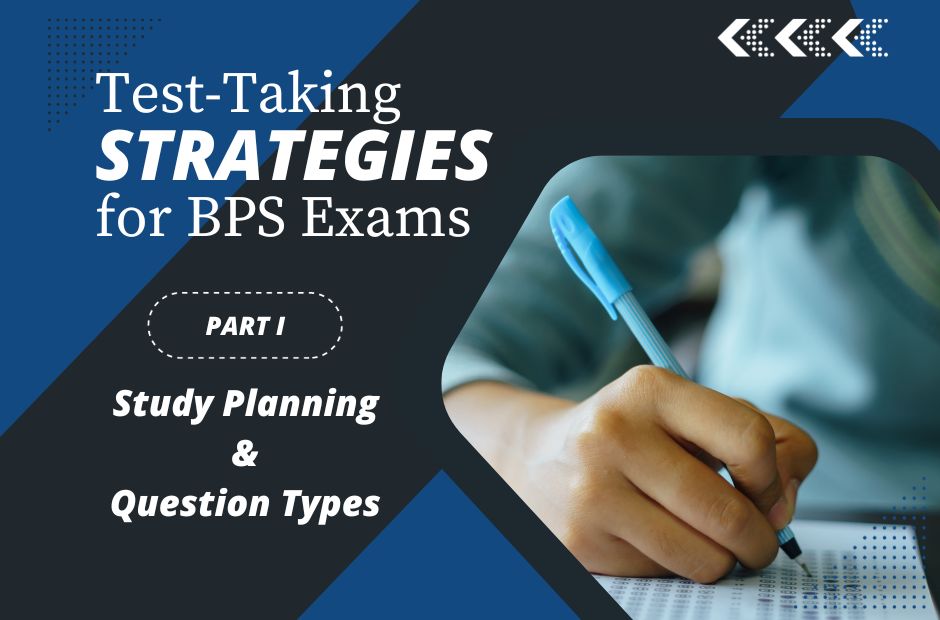Part 1: Study Planning & Question Types
Congratulations! You've decided to pursue a Pharmacy Specialty Certification. You are committed to professional development, improving healthcare and striving to demonstrate a continued pursuit of excellence through this prestigious certification. Candidates must demonstrate a commitment to their specialty to qualify to sit the exam, yet pass rates are surprisingly low. Many excellent clinical pharmacists are unsuccessful the first time they attempt certification. We want to ensure this isn't your story.
Consider this scenario: Dr. Sanders has 5 years of experience in his specialty under his belt. He spends several months studying and reviewing for his exam, and is confident in his knowledge. Test day arrives, and as he reads the first question, flashbacks of terrible test experiences cloud his mind. His palms start to sweat and his mind races. Although Dr. Sanders is a skilled pharmacist, he has never considered himself a "good test-taker." Will this perception prevent him from passing the exam for which he has so diligently prepared?
While preparing for your BPS exam, remember the task at hand: taking a test.
While a thorough understanding of pharmacology and therapeutics is crucial for success on BPS exams, developing test-taking skills is crucial leading up to the exam. Our experienced editors, who have successfully conquered these exams, provide valuable, straightforward strategies to guide you through the "test-taking" aspect of BPS exams.
GENERAL STRATEGIES
Failing to plan is planning to fail.
To-Do List
- Proactively schedule test preparation time.
- Determine areas of weakness. 1
- Eliminate knowledge gaps.
- Plan how to apply your knowledge to the exam.
- Stick to the plan.
Know the Framework
Your preparation time will be significantly more efficient if you know the parameters of the exam.
- Multiple-Choice Questions
- 60-70 Seconds (Avg) per Question
- Possible Extra Time
- Tested Knowledge
- 20% Explicit (Memorized Facts)
- 80% Tacit (Application of Explicit Knowledge to Real Scenarios)
- Content Covered
- 90% Patient Care & Translation of Evidence Into Care
- 10% Specialty Advancement
- All Questions
- Multiple-Choice Format
- Single Correct Answer (No "Select All that Apply")

Practice
Olympic athletes don't simply understand and study their sport - they practice it. The same concept applies to test preparation. Testing doesn't involve treating a patient or discussing the information. Rather, knowledge is demonstrated by accurately answering multiple-choice questions. You must consistently practice answering questions to be comfortable, efficient, and gain confidence. Comprehensive Q-banks2 are an invaluable preparation resource.
Maintain the Mindset
The information tested will only be well-established standards of practice. Avoid complicating things by spending time & brain power on newly emerging or debated data.
Manage Time
You will need to maintain an average of 70 seconds per question to finish the exam on time. Some questions may be obvious and quick, while others may take more time to consider. Take note of how much time you spend on each question. Time yourself taking practice exams or answering Q-bank questions. Learn how long it takes you to complete each question, and strive to decrease that time if necessary.
Leave No Blanks
Do not leave a question blank! If you are almost out of time and have not completed the exam, choose answers for the remaining questions. There are four possible answers to each question, which gives you a 25% chance of choosing the correct answer. Take advantage of that chance!
STRATEGIES FOR VARIOUS QUESTION TYPES
While it is imperative to possess the pharmaceutical knowledge, you should also practice test-taking skills to properly demonstrate that knowledge.

Download a printable version of the question type chart here.
Question Type Example
Let's practice using the negative question strategy.
Sample Question: Which of the following is not a risk factor for diabetes?
Sample Answer: NSAID use
Turn the Answer into a True/False Question: NSAID use is a risk factor for diabetes. This statement is false; therefore, it is the correct answer.
ADDITIONAL TIPS TO KEEP IN MIND
- If you must qualify your answer, it is likely incorrect. On these exams, you cannot discuss or add to your answer. You are not debating with a colleague or trying to convince a patient. You must choose the correct answer provided.
- Do not assume more information than what is present in the question. Each question is worded carefully to provide the exact details you need to choose the correct answer.
- Consider ruling out answers with extreme wording like "always, every, must, never, or only". Medical situations are rarely "one size fits all."
- Look for potential grammatical clues where the question and answer combine into a sensible statement.
- Longer answer options are more likely to be correct as test writers tend to add qualifying language to make it unambiguously correct.
In preparing for your BPS exam, remember what you're going to be doing: taking a test.
PREPARE TO SUCCEED
PLAN your preparation time and PRACTICE exam questions. Many great resources are available to help you prepare for your exam. Choose these carefully and use them consistently. Keep in mind what will be on the test and why. Remember why you are here in the first place: to prove that you are a cut above the rest and can serve your community to the fullest. This is already an accomplishment worth noting!
1 Study Plan Strategies - Watch this helpful video to learn how to use tools in the High-Yield courses to identify and address knowledge gaps.
2 Looking for Q-bank practice? Find High-Yield Med Reviews' Options Here.
additional resources
Check out our FREE webinars on Board Certification & Test-Taking Strategies!
Blog: 6 Reasons to Become a Board Certified Pharmacist
Blog: BPS Test-Taking Strategies Series: Part II
Blog: How Important are Biostatistics & Clinical Literature on BPS Exams?



